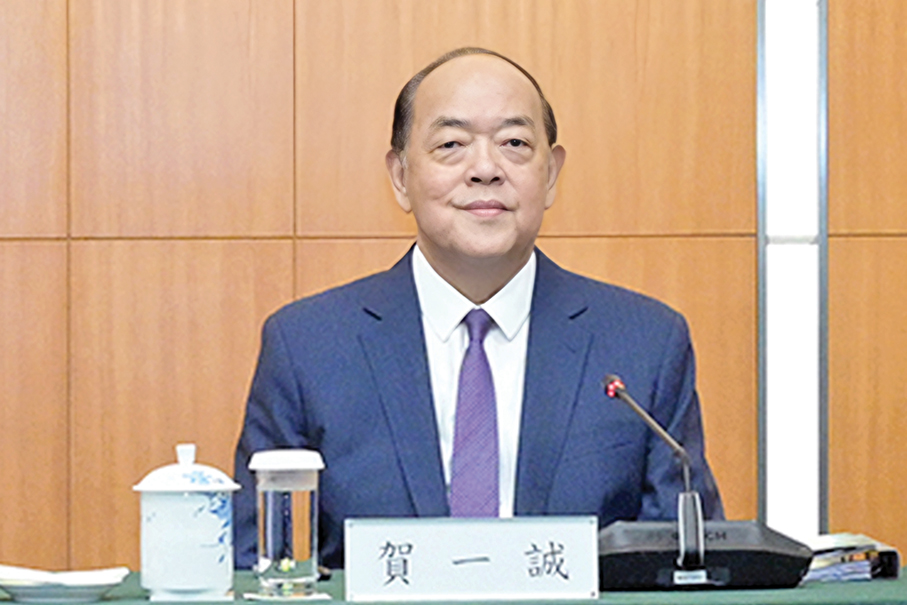Nearly five years after taking the helm of the local government on December 20, 2019, Chief Executive (CE) Ho Iat Seng announced yesterday that he will not seek a second term as chief executive “due to health concerns”.
Ho’s current term ends at midnight on December 19. His successor’s term will start immediately afterwards.
The Government Information Bureau (GCS) issued yesterday afternoon a statement announcing Chief Executive Ho Iat Seng’s decision not to run in the election for the sixth-term chief executive, making it clear that he will not take part in the CE election scheduled to be held on October 13.
Ho was elected the fifth-term chief executive of the Macau Special Administrative Region (SAR) on August 25, 2019 with 392 of 400 valid votes in his favour by the 400-member chief executive election committee, and he assumed office on December 20 that year. Ho, born in Macau in 1957, served as a member of the Executive Council (ExCo) – the government’s top advisory body – from 2004 to 2009. In 2013, he was elected president of the Legislative Assembly (AL) and re-elected in 2017. Ho was deputy to the 9th, 10th, 11th, 12th and 13th National People’s Congress (NPC), as well as a member of its standing committee.
In his statement, Ho expressed his gratitude to the central authorities in Beijing, the local community and the general public for the full trust and firm support he has received during his term of office, as well as to all public servants for their close collaboration and cooperation: “As the fifth term of office of the Chief Executive of the Macau Special Administrative Region draws to a close, I, Ho Iat Seng, would like to express my sincere thanks for the total trust and firm support that have been given to me over the past five years by the central authorities, the various sectors of Macau society and the entire population. I would also like to thank all the public servants for their close cooperation”.
Ho went on to say: “The fifth Macau SAR government and I have adhered to the concept of ‘Synergies and Advancement, Change and Innovation’ in planning and promoting Macau’s diversified development, devoting efforts to create a new environment for Macau’s development while building Macau’s new competitive advantages,” underlining that he has deep feelings for Macau in his heart and has done his utmost for Macau’s development.
As the reason for his decision not to take part in the CE election, Ho said that “my health has not been fully restored”, adding that for the sake of Macau’s long-term development and from the perspective of the overall situation, he has decided to refrain from participating in the election for the sixth-term chief executive.
Ho pledged his full support to the sixth-term chief executive and government to govern in accordance with the law: “I will fully support the sixth chief executive and the Macau SAR government in governing in accordance with the law and in their continued contribution to the cause of ‘One Country, Two Systems’ and the development of Macau”.
Ho went on leave on June 21, then extended his leave twice until July 29, during which time the Government Information Bureau issued a statement on his behalf noting that Ho had taken advantage of his leave of absence to undergo a routine medical check-up and to receive the necessary medical treatment, and that he was in good health. After resuming work on July 30, Ho attended a number of official events, including a briefing on the spirit of the third Plenary Session of the 20th Central Committee of the Communist Party of China and a meeting with Shi Taifeng, head of the Communist Party of China’s (CPC) Central Committee’s United Front Work Department (UFWD), as well as a reception held by the People’s Liberation Army (PLA) Macau Garrison to mark the 97th anniversary of the founding of the Chinese People’s Liberation Army.
The election for the sixth term of chief executive (CE) has been slated for Sunday, October 13. The nomination period for candidates in the sixth-term chief executive election will run from next Thursday to September 12, during which anyone interested in running for the position or their representative may collect election nomination form from the Chief Executive Electoral Affairs Commission (CAECE) and later submit it with the signatures of at least 66 members of the 400-member Chief Executive Election Committee, or 16.5 percent of the total number of electors.
Macau’s two former chief executives - Edmund Ho Hau Wah and Fernando Chui Sai On served their two five-year terms of office in 1999-2009 and 2009-2019 respectively.
According to the Macau Basic Law, the special administrative region’s chief executives can serve up to two five-year terms.
CE Election Committee members’ expectations of new chief executive
Meanwhile, following the announced by Ho Iat Seng that he would not run for a second term in the CE election, three Chief Executive Election Committee members expressed their empathy regarding Ho’s health condition and their recognition of his work during his term in office, in separate interviews with the Post on WeChat and WhatsApp yesterday.
Business community leader Kevin Ho King Lun, one of Macau’s 12 deputies to the National People’s Congress (NPC), said: “I think even if the chief executive does not seek re-election, it does not mean that there will be a big adjustment to the future government’s administration,” adding he believed that the new government will also move Macau’s development towards a diversified economy, which is an overall goal that the central authorities and all the people of Macau would like to see.
Commentator Ron Lam U Tou, a directly-elected lawmaker, said: “It seems that the incumbent chief executive’s decision not to run for a second term may be a good choice for the whole community and for future aspirations,” adding that even though Ho had made an effort to push Macau’s development in a different direction, Macau’s socio-economic conditions have remained unchanged even after the three-year COVID-19 pandemic and the extension of the six gaming concession agreements.
Lam said he expects the new chief executive to give an account to the public on the policies proposed and those in progress by the current-term government, such as the Light Rail Transit (LRT) East Line, the four-key industrial development objectives – 1) big health, 2) modern finance, 3) high-tech, and 4) conventions and exhibitions as well as culture and sports; the government’s rental housing building for senior citizens, and the Islands Healthcare Complex – Macao Medical Centre of Peking Union Medical College Hospital (PUMCH) – in south Cotai.
Dominic Sio Chi Wai, a local NPC deputy, said he expected the new government to continue to solve the current economic issues under the global economic crisis and lead civil society as a whole towards stability, adding: “Representing the clout of different sectors of society, each member of the CE election committee will do their best to select a person who is suitable for the times to lead the society”.

This file photo shows Chief Executive Ho Iat Seng addressing a session at Government Headquarters on Friday last week about the spirit of the third plenary session of the 20th Communist Party of China (CPC) Central Committee. – Photo: GCS









